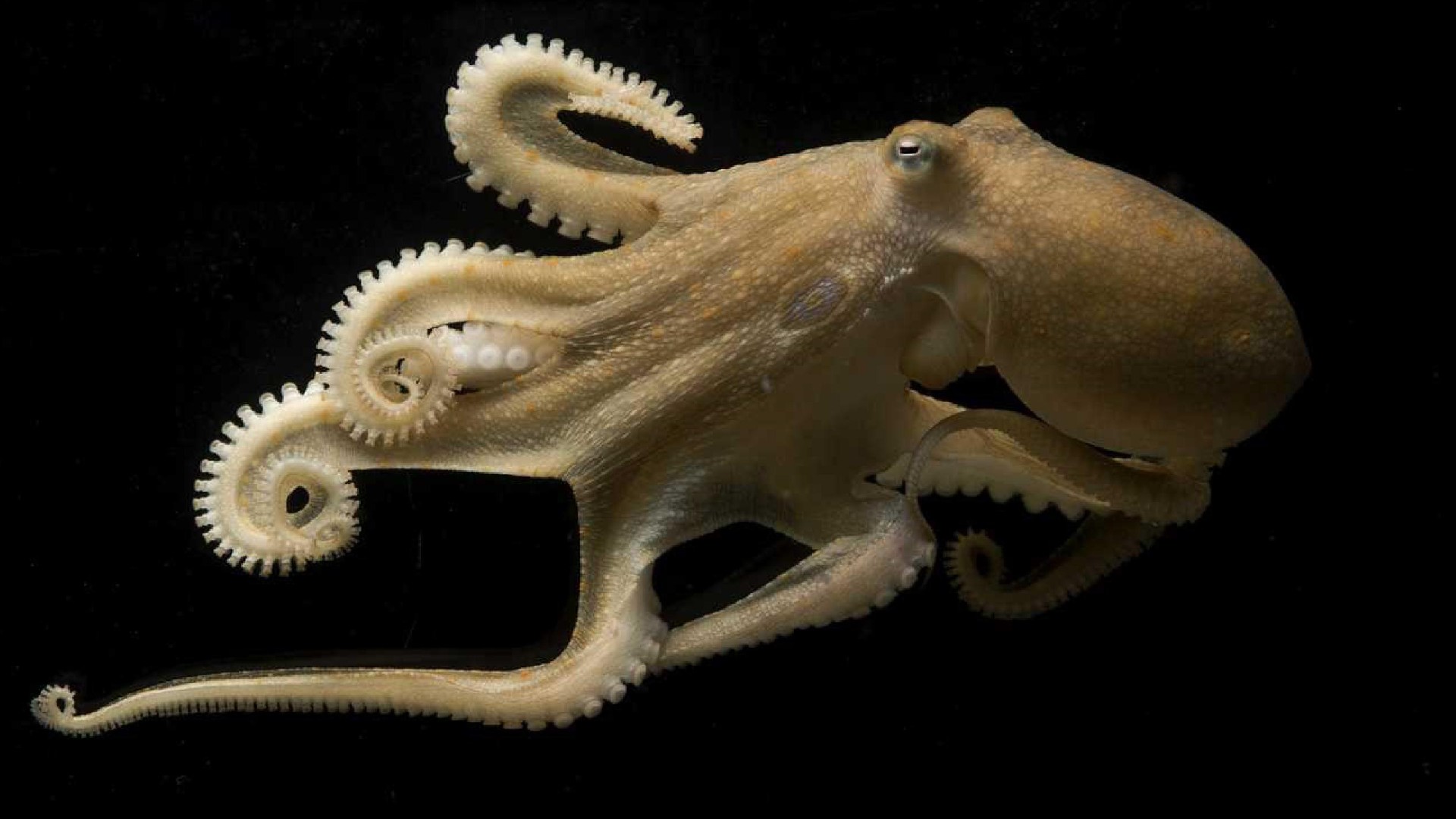Octopuses 'rewire' their brains to adapt to different ocean temperatures
Octopuses edit their RNA to adapt to fluctuating temperatures, from the warm waters of summer to chilly ocean temperatures in winter.
As the seasons change, octopuses rewire their brains to adapt to fluctuating ocean temperatures, a new study finds.
Octopuses and other cephalopods are cold-blooded, or ectothermic, meaning they cannot internally regulate their body temperature. As a result, they are vulnerable to external temperatures in the water, which can threaten the brain function of these exceptionally intelligent creatures if the water gets too cold or too hot.
To prevent this, California two-spot octopuses (Octopus bimaculoides) edit their RNA — the messenger molecule between DNA and proteins — to produce different neural proteins in response to varying temperatures, according to the study, which was published Thursday (June 8) in the journal Cell. Led by researchers at the Marine Biological Laboratory in Woods Hole, Massachusetts, the study focuses on messenger RNA, which acts as a messenger for the instructions encoded in DNA and carries that transcribed genetic information to the protein-building factories, or ribosomes, in cells.
Related: Octopuses may be so terrifyingly smart because they share humans' genes for intelligence
During the study, scientists gathered 12 wild-caught California two-spot octopuses — a yellowish-brown species known for its two iridescent blue false eyes — and split them into two groups based on different test conditions: a warm tank with water that was 71 degrees Fahrenheit (22 degrees Celsius) and a cold tank with water that was 55 F (13 C). After several weeks, the researchers compared the RNA transcripts of the octopuses in the warm tanks to the ones in the cold.
They expected to see changes in the RNA at only a few sites. Instead, they discovered changes at more than 20,000 of the 60,000 sites they looked at. And these RNA edits started happening within a matter of hours after the octopuses were exposed to new temperatures, the researchers found.
"The beauty of RNA editing is that, on one hand, you change the genetic information and it's quite fluid, and on the other hand, you will keep the DNA intact," study co-author Eli Eisenberg, a genetics researcher at Tel Aviv University in Israel, told Live Science. "That's a nice thing that you can edit the RNA according to the needs of the present environment."
Get the world’s most fascinating discoveries delivered straight to your inbox.
For the next part of their study, they worked with researchers at the University of Michigan and Texas Tech University to determine whether these RNA changes actually affected protein structure. To do so, they compared the edited and unedited versions of two proteins in the octopuses that are crucial for nervous system function: kinesin, which are associated with cell membranes, and synaptotagmin, a calcium-binding protein.
They found evidence confirming that temperature-driven changes in the RNA translated into structural changes in kinesin and synaptotagmin — and that these changes would also affect the proteins' function, likely in a way that makes the octopuses better adapted to the chilly or warm waters they are operating in.
"One could say that [many of] the proteins that the octopus uses in the winter are not the same as the ones it uses in summer," Eisenberg said. A 2012 study showed differences in the RNA of different octopus species living in a variety of warm and cold environments, but this is the first research to show RNA editing happening in one octopus species in response to real-time changes in temperature, the researchers said.
For many species, RNA editing has little or no effect on an individual because it happens in regions of the DNA that do not code for anything. For example, humans have millions of RNA editing sites, but only 3% of these affect proteins' structure. In octopuses, RNA editing affects the majority of their neural proteins, and now scientists know that these sophisticated cephalopods use this ability to acclimate to warm and chilly waters.
The researchers also found evidence that the Verrill's two-spot octopus (Octopus bimaculatus), a closely related relative, also had temperature-sensitive RNA, suggesting that this phenomenon may be widespread among octopuses and squid.
"At the end of the day, we know very little about [cephalopods]," said Michael Kuba, an ecologist who specializes in cephalopods at the University of Naples in Italy and who was not involved in the study. "This paper is just an extremely important first step to really understand more how they deal with the environment," he told Live Science.
Eisenberg and his team are now working on further research to determine whether RNA editing is helping octopuses adapt to other environmental conditions, such as low-pH (acidic) or low-oxygen ("hypoxic") areas, which could become more common as climate change accelerates.

Kiley Price is a former Live Science staff writer based in New York City. Her work has appeared in National Geographic, Slate, Mongabay and more. She holds a bachelor's degree from Wake Forest University, where she studied biology and journalism, and has a master's degree from New York University's Science, Health and Environmental Reporting Program.



